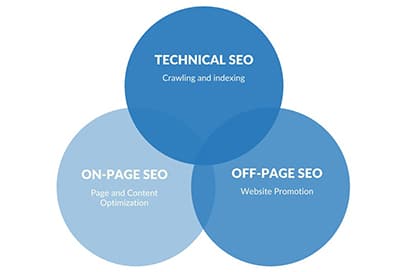SEO for Small Business: The Ultimate Guide
- September 1, 2023
- Content Marketing, Digital Marketing, Search Engine Optimization, Social Media Marketing, WordPress SEO
Imagine having a steady stream of customers discovering your small business without spending a fortune on advertising. Sounds too good to be true, right? Well, it’s not only possible, but achievable with a solid SEO for small business strategy. In today’s digital landscape, search engine optimization (SEO) is vital for small businesses to increase their online visibility and attract customers. In this comprehensive guide, we’ll take you through the key aspects of SEO for small business, from understanding search engines to monitoring and analyzing your efforts.
Short Summary
- Small businesses can benefit from SEO to improve online visibility, drive organic traffic and increase sales.
- SEO involves keyword research & selection, on-page optimization, link building strategies and local SEO.
- Utilize Google Analytics & Search Console for monitoring & analyzing your efforts alongside periodic audits for successful optimization.
Understanding Small Business SEO
With over 3.5 billion searches performed on Google every day, it’s crucial for small businesses to have a strong online presence. But how can you stand out in the crowded search engine results? That’s where SEO comes into play. By using targeted SEO strategies, you can improve your website’s visibility, drive more organic traffic, and ultimately, increase sales.
In this section, we’ll explain the role of search engines and the benefits of a well-planned SEO strategy for small businesses.
The Role of Search Engines
Search engines like Google, Bing, and Yahoo analyze and categorize web pages based on various factors, such as keywords, relevance, and user experience. This helps websites rank higher in search engine results pages (SERPs) and drives more organic traffic to the site. So, how do search engines contribute to organic traffic? They emphasize content that is pertinent and of superior quality, which is the core of search engine optimization.
SEO tools and techniques can help you optimize your website to provide search engines with the information they need to rank your content higher in search results. This includes on-page SEO, local SEO, and technical SEO tasks, all of which play a crucial role in improving your website’s visibility. By leveraging the power of search engines, your small business can reach more potential customers and grow its online presence.
Benefits of SEO for Small Businesses
Implementing a well-crafted SEO strategy offers numerous benefits for small businesses, including increased visibility, cost-effective marketing, and a competitive edge. With the majority of consumers using search engines to find products and services, it’s essential for small businesses to rank high in search results. SEO can help you achieve this goal, bringing more targeted traffic to your website and ultimately, increasing sales.
Moreover, SEO allows small businesses to compete with larger companies in the industry by solidifying their presence in the marketplace. By investing time and effort into optimizing your website and content, you’ll be better positioned to attract and retain customers. In today’s digital world, a solid SEO strategy is no longer a luxury – it’s a necessity for any small business owner looking to thrive online.
Crafting Your Small Business SEO Strategy
Now that we understand the importance of SEO for small businesses, let’s dive into the key components of a successful SEO strategy. From conducting keyword research to optimizing on-page elements and building high-quality backlinks, crafting an effective SEO strategy requires a multi-faceted approach.
In this section, we’ll explore the essential elements of a small business SEO strategy and provide actionable steps to help you get started.
Keyword Research and Selection
To kick off your small business SEO strategy, you’ll need to conduct thorough keyword research. This process involves identifying the most relevant words and phrases that your target audience uses when searching for products or services like yours. Focusing on long-tail keywords and local search terms can help you rank higher in search results and attract more relevant traffic to your website.
To conduct keyword research, start by compiling a list of terms that potential customers might use to find businesses similar to yours. Tools like Google’s Keyword Planner can help you analyze these terms, providing valuable data on search volume, competition, and more. Once you’ve identified the most promising keywords, incorporate them into your website content and optimize on-page elements to improve your search engine rankings.
Optimizing On-Page Elements
Optimizing on-page elements is crucial for achieving better search engine visibility and attracting more organic traffic. This includes meta tags, headers, and image alt text, which play a significant role in helping search engines understand the content on your website. By optimizing these elements, you can provide search engines with the necessary information to rank your content higher in search results.
In addition to optimizing meta tags and headers, focus on creating high-quality, engaging content that addresses the needs and concerns of your target audience. Use your chosen keywords naturally throughout your content, but avoid keyword stuffing, as this can negatively impact your search engine rankings.
By creating valuable content and optimizing on-page elements, you’ll be well on your way to improving your small business’s online visibility.
Link Building Strategies
Link building is another crucial component of a successful small business SEO strategy. By gaining high-quality, relevant links from other websites, you can improve your website’s credibility and authority in the eyes of search engines. This, in turn, can lead to higher search engine rankings and increased organic traffic.
Some effective link building strategies for small businesses include local outreach, guest posting, and leveraging business partnerships to gain links on other sites. For instance, you could submit stories to local media outlets, collaborate with other businesses on shared content, or seek out like-minded companies within your network interested in exchanging relevant links.
By employing a variety of link building strategies, you can strengthen your website’s online presence and enhance your SEO efforts.
Local SEO for Small Businesses
For small businesses, focusing on local SEO is paramount to attract customers in your area and compete in the local market. Local SEO involves optimizing your Google Business Profile, managing local listings and citations, and targeting local search terms to improve your visibility in local search results, ultimately benefiting your local business.
In this section, we’ll delve deeper into local SEO strategies and how they can help your small business thrive in the digital landscape.
Google Business Profile Optimization
Optimizing your Google Business Profile is essential for enhancing local search visibility and customer engagement. Google Business Profile is a free tool that enables businesses to manage their online presence across Google Search and Google Maps. By providing accurate and up-to-date information on your business, you can improve your chances of appearing in local search results and attracting more customers.
To optimize your Google Business Profile, ensure that all information, such as your business name, address, phone number, and hours of operation, is accurate and consistent across all platforms. Additionally, add high-quality photos of your business, respond to customer reviews, and use relevant categories and keywords to help search engines understand your offerings. By taking these steps, you can boost your local SEO efforts and increase your visibility in local search results.
Managing Local Listings and Citations
Local listings and citations refer to online mentions of your business’s name, address, and phone number (NAP) on various websites and directories. Ensuring that your business information is consistent and accurate across the web is crucial for improving your local search rankings and attracting more local customers.
To manage your local listings and citations, start by auditing your current online presence to identify any inconsistencies or inaccuracies. Update your NAP information on all relevant websites and directories, and submit your business to additional platforms if necessary.
By maintaining accurate and consistent business information across the web, you’ll strengthen your local SEO efforts and boost your online visibility in local search results.
Content Creation and Marketing
Content creation and marketing play a vital role in small business SEO, as they help establish your brand’s expertise, target long-tail keywords, and engage with your audience. From blogging to utilizing multimedia content, creating high-quality and valuable content is essential for attracting and retaining customers.
In this section, we’ll explore the importance of content creation and marketing in small business SEO and how you can leverage various content formats to boost your online presence.
Blogging for Small Business SEO
Blogging offers numerous benefits for small business SEO, from establishing your expertise to targeting long-tail keywords and engaging with your local community. By creating valuable and informative blog content, you can attract more organic traffic to your website, build trust with your audience, and ultimately, drive more sales.
To optimize your blog content for SEO, incorporate your chosen keywords naturally throughout your content and use relevant headings and subheadings to improve readability. In addition, consider incorporating multimedia content, such as images and videos, to enhance user engagement and make the content more visually appealing.
By consistently publishing high-quality blog content, you’ll strengthen your online presence and improve your small business’s SEO.
Utilizing Multimedia Content
Multimedia content, such as images and videos, can significantly enhance user experience and boost search engine rankings. By incorporating visuals into your website content, you can make the content more engaging, visually appealing, and easier to consume.
To optimize multimedia content for SEO, ensure that your images and videos are properly formatted, compressed, and accompanied by relevant alt text and captions. In addition, consider sharing your multimedia content on social media platforms to increase your reach and attract more traffic to your website.
By utilizing multimedia content effectively, you can improve user experience and achieve higher search engine rankings.
Technical SEO for Small Businesses
Technical SEO is another essential aspect of small business SEO, involving the optimization of various technical elements of your website to enhance search engine visibility and user experience. In this section, we’ll discuss key aspects of technical SEO, including site structure, internal linking, and schema markup implementation, and how they can benefit your small business.
Site Structure and Internal Linking
A well-structured website with clear navigation and effective internal linking is crucial for both user experience and SEO. By creating a logical hierarchy of pages, using descriptive page titles and URLs, and incorporating internal links to connect related pages, you can help search engines understand the structure of your website and index it more effectively.
To optimize your site structure and internal linking, start by auditing your current website architecture and identifying areas for improvement. Ensure that your website is easy to navigate and that all pages are accessible within a few clicks. By organizing your website in a logical manner, you’ll improve user experience and boost your search engine rankings.
Schema Markup Implementation
Schema markup, also known as structured data, is a vocabulary that helps search engines understand the content on your webpages, providing additional context and details about the content. By implementing schema markup, you can enhance search engine understanding and improve your website’s appearance in SERPs.
To get started with schema markup implementation, explore the various types of schema available for local businesses and choose the ones that are most relevant to your website content. Once you’ve selected the appropriate schema types, add the necessary markup to your website code and validate it using Google’s Structured Data Testing Tool.
By implementing schema markup effectively, you can enhance your website’s search engine visibility and attract more targeted traffic.
Monitoring and Analyzing Your SEO Efforts
Monitoring and analyzing your SEO efforts are crucial for identifying areas of improvement, measuring the success of your strategies, and ensuring a strong online presence. In this section, we’ll discuss the importance of using tools like Google Analytics and Search Console to track website performance, identify issues, and measure the success of your SEO efforts.
Google Analytics and Search Console
Google Analytics and Search Console are powerful tools that offer invaluable insights into your website’s performance, traffic, user engagement, and more. By setting up and monitoring these tools, you can identify areas for improvement, measure the success of your SEO efforts, and ensure that your website is functioning optimally in search engine results.
To get started with Google Analytics and Search Console, set up accounts for both tools and link them to your website. Once connected, you’ll have access to a wealth of data, including information on organic traffic, user behavior, and search engine rankings. By regularly monitoring this data, you can make informed decisions about your SEO strategy and continuously improve your online presence.
Conducting Regular SEO Audits
Conducting regular SEO audits is essential for identifying and resolving issues, optimizing content, and maintaining a strong online presence. By regularly evaluating your website’s performance and addressing any technical or content-related issues, you can ensure that your website remains competitive in search engine results.
To conduct an SEO audit, start by analyzing your website’s performance, pinpointing any issues, and implementing changes to enhance your website’s visibility and ranking. This might include optimizing on-page elements, fixing broken links, or improving site structure.
By performing regular SEO audits, you’ll stay ahead of the competition and ensure that your small business continues to thrive online.
Summary
In conclusion, small business SEO is a vital component of any successful digital marketing strategy. By understanding the role of search engines, crafting a well-rounded SEO strategy, focusing on local SEO, creating valuable content, addressing technical SEO aspects, and monitoring and analyzing your efforts, you can significantly improve your online visibility and attract more customers. Remember that SEO is an ongoing process, and with dedication and persistence, your small business can achieve lasting success in the digital landscape.
Frequently Asked Questions
Is SEO worth it for small business?
SEO can increase the number of visitors to your website, potentially leading to more sales and growth for your small business.
Investing in SEO is well worth the effort for small businesses.
How much does it cost to do SEO?
SEO services typically cost $2,500 to $10,000 per month, with most businesses having budgets of $500 – $5,000.
SEO costs can vary depending on the size of the project, and hourly rates are typically around $100-$300.
How do I SEO my website?
To SEO your website, conduct keyword research and use relevant terms throughout your page, include SEO in permalinks, hyperlink existing content, create high-quality content, optimize images, maintain a fast page speed, and follow the guidelines outlined in Google’s Search Central SEO Starter Guide.
What are some effective link building strategies for small businesses?
Link building for small businesses can be accomplished through local outreach, guest posting, and leveraging business partnerships to gain links on other websites.
This will help improve your website’s credibility and authority.
How can multimedia content enhance user experience and search engine rankings?
Multimedia content can make content more engaging and visually appealing, thus improving user experience and helping to boost search engine rankings.
Using multimedia content can be a great way to draw in readers and keep them engaged. It can also help to make your content more memorable and easier to understand. Additionally, it can help boost your search.
About us and this blog
We are a digital marketing company with a focus on helping our customers achieve great results across several key areas.
Request a free quote
We offer professional SEO services that help websites increase their organic search score drastically in order to compete for the highest rankings even when it comes to highly competitive keywords.














